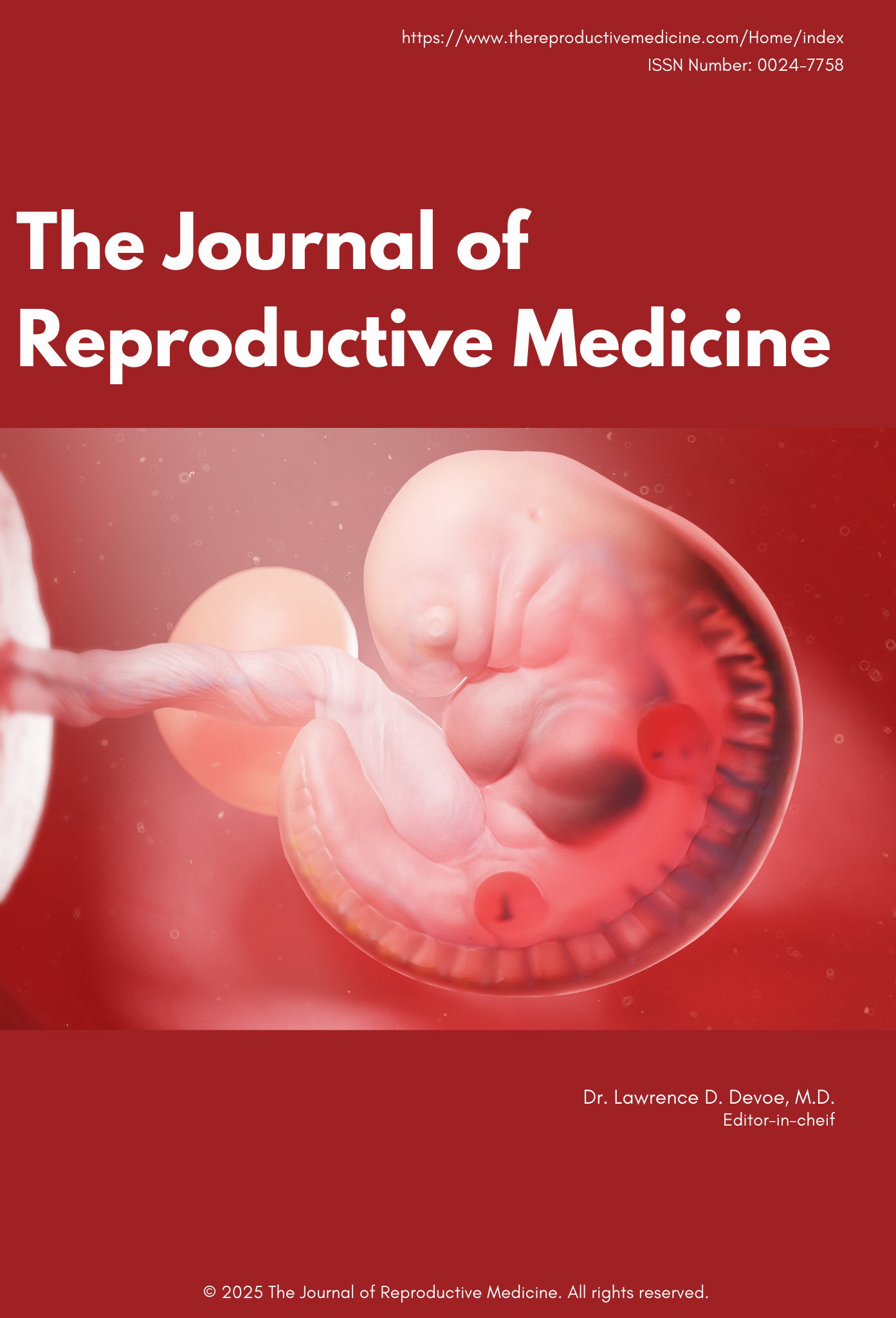Volume 53, Number 4, April 2008
| Editorial | |
| 241 | " align="left" valign="top" class="tocTitle">
Lawrence D. Devoe, M.D.
|
|
|
|
| Original Articles | |
| 243 | " align="left" valign="top" class="tocTitle">
Beth J. Plante, M.D., Jeffrey D. Blume, Ph.D., Geralyn Lambert-Messerlian, Ph.D., Rebecca Shackelton, Sc.M., Jacob Canick, Ph.D., and Maureen G. Phipps, M.D., M.P.H.
A multiple marker model including serum biomarkers, ultrasound findings and clinical information predicted pregnancy viability in symptomatic women with overall accuracy of 90%.
|
|
|
|
| 250 |
Janne-Meije van Weert, M.D., Sjoerd Repping, Ph.D., Jan Willem van der Steeg, M.D., Pieternel Steures, M.D., Fulco van der Veen, M.D., Ph.D., and Ben Willem Mol, M.D., Ph.D.
Use of a prediction model that includes antisperm antibodies improves the efficiency of in vitro fertilization in cases of male subfertility.
|
|
|
|
| 257 |
Suleyman Guven, M.D., G. Serdar Gunalp, M.D., and Yasar Tekin, Ph.D.
The number of preovulatory follicles and the percentage of normal sperm morphology in processed sperm may be used in the prediction of a favorable intrauterine insemination outcome.
|
|
|
|
| 266 |
Thomas J. Kuehl, Ph.D., A. Michael Speikermann, Ph.D., Sherilyn A. Willis, M.D., Andrea Coffee, Pharm.D., and Patricia J. Sulak, M.D.
The 7-day hormone-free interval of standard and extended oral contraceptive regimens results in cyclic fluctuations of ovarian hormones and associated hormone withdrawal symptoms.
|
|
|
|
| 271 |
Michael V. Muench, M.D., Ahmet A. Baschat, M.D., Yinka Oyelese, M.D., Michelle L. Kush, M.D., Hugh E. Mighty, M.D., and Andrew M. Malinow, M.D.
Aggressive management with prostaglandins and ligation or embolization of the uterine or internal iliac vessels, with quick recourse to hysterectomy in cases in which these measures have failed, may reduce morbidity and lead to improved outcomes.
|
|
|
|
| 279 |
Nathan S. Fox, M.D., Lauren Feit, M.D., and Daniel Skupski, M.D.
Our data do not support the hypothesis that pregnancy is associated with vascular remodeling, leading to increased vascular compliance in subsequent pregnancies.
|
|
|
|
| 283 |
Natalie Roche, M.D., Joan Skurnick, Ph.D., Keleicia Brown, M.D., and Debra S. Heller, M.D.
A lean umbilical cord is associated with a variety of adverse perinatal outcomes, but our findings do not support the theory that such a cord explains stillbirths with no other significant findings at autopsy.
|
|
|
|
| 287 |
Tomer Feigenberg, M.D., Avi Ben-Shushan, M.D., Khaula Daka, M.D., Benjamin Y. Klein, M.D., Ronald A. Bloom, M.D., and Nathan Rojansky, M.D.
The study of bone status changes by measuring SOS at the tibial shaft is well supported by reports demonstrating its excellent precision and diagnostic sensitivity.
|
|
|
|
| 294 |
James L. Whiteside, M.D., Alexei Viazmenski, M.D., Kris Strohbehn, M.D., and Paul D. Hanissian, M.D.
Pelvic organ prolapse reduction during urodynamic testing reduces leak point pressure; however, the role of prolapse reduction during urodynamic testing remains unclear.
|
|
|
|
| Case Reports | |
| 299 |
John P. Micha, M.D., Bram H. Goldstein, Ph.D., Mark A. Rettenmaier, M.D., Erin J. Tinnerman-Minailo, P.A.-C., John V. Brown III, M.D., Stephanie N. McClellan, M.D., and Bonnie V. Bock, M.D.
Once the condition is suspected, infectious disease consultation should be obtained to identify the specific bacteria and implement optimal antibiotic therapy.
|
|
|
|
| 302 |
Valerie A. Fitzhugh, M.D., Lisa Pompeo, M.D., and Debra S. Heller, M.D.
Actinomycosis of the placenta, an extremely rare cause of necrotizing chorioamnionitis, resulted in preterm delivery.
|
|
|
|
| 305 |
Joyce Purakal, M.D., Gayle Moyer, M.D., and William Burke, M.D.
Women with systemic lupus erythematosus may be at greater risk for vaginal cuff dehiscence after total laparoscopic hysterectomy.
|
|
|
|
| 308 |
Peter Lee, M.D., Michael House, M.D., Neil Halin, D.O., and Rafeeque Bhadelia, M.D.
Heterotopic pregnancies with coexisting abdominal and intrauterine pregnancies pose unique management challenges.
|
| 311 |






